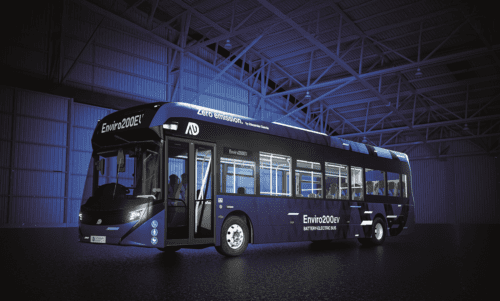
…but not until early next year. The manufacturer will show examples of its Enviro100EV and Enviro400EV at Euro Bus Expo, reports Jonathan Welch
Although some manufacturers have chosen not to take part this year, Alexander Dennis says that as the UK’s largest bus manufacturer it is continuing to fully support Euro Bus Expo, and sees the bi-annual event as an excellent opportunity to engage with stakeholders, customers and friends across the industry. The manufacturer says it has a ‘unique stand concept’ this year, with two next generation electric buses scheduled to be on display, an Enviro400EV for Transdev Blazefield and an Enviro100EV for Transport for London alongside a ‘discovery theatre’ where visitors will be able to learn more about the third model in its range, the Enviro200EV. The new AD24 digital platform will also be available for demonstration, along with ‘expert stations’ for route modelling, and the usual high level of hospitality.
Alexander Dennis recently hosted a pre-show press conference, to explain its current portfolio and product range in more detail, as well as give a preview of what is around the corner. President and Managing Director Paul Davis began with an update on the next generation of products launched at Farnborough last year and subsequently shown off at Millbrook.
As highlighted in our news pages this week, one topic that Paul discussed was the growing interest in energy efficiency of electric vehicles, explaining that Alexander Dennis has made what he called ‘very considered choices’ when it comes to component selection, battery capacity and motors. “The great thing about our company is that we have a lot of bus knowledge and expertise,” he said.
Presenting a graphic that showed a comparison between the new Enviro400EV and three competitors, “what we have here is the outcome of all those good choices,” Paul explained, highlighting an estimated cost saving of between £30,000 and £210,000 over 10 years compared to current market rivals based solely on charging and consumption figures.
As Paul pointed out, the Zemo testing and certification process, which has shown a saving in energy cost of at least 14% over another similar bus on the market, gives an ‘apples for apples’ comparison which, even if not a real world test, gives a good basis for comparison between vehicle types. “What it shows is that we have the most efficiency from a drive standpoint at 0.67kW per kilometre, but importantly we also only lose a very small amount of energy when we charge the bus.
“This is starting to become a much more relevant conversation, as people gain experience with electric buses and other manufacturers’ products and start to see some of the differences that exist between them. The total cost of ownership benefit is really quite significant; we can see the output of all of our thoughtful engineering start to play out.
[…]
By subscribing you will benefit from:
- Operator & Supplier Profiles
- Face-to-Face Interviews
- Lastest News
- Test Drives and Reviews
- Legal Updates
- Route Focus
- Industry Insider Opinions
- Passenger Perspective
- Vehicle Launches
- and much more!


